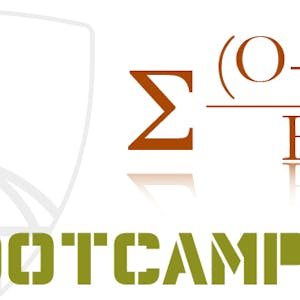Enhance your understanding of data analysis and statistical inference with the Mathematical Biostatistics Boot Camp 2. This course provides a deep dive into fundamental concepts, equipping you with the knowledge and skills to analyze one and two independent samples. The curriculum covers hypothesis testing, two binomials, discrete data settings, and various techniques.
Throughout the course, you will explore a range of topics, including hypothesis testing, confidence intervals, power calculations, binomial tests, Fisher's exact test, chi-squared testing, and Simpson's paradox. Engage in module quizzes and homework to reinforce your learning and test your comprehension of the material.
By completing this course, you will gain valuable insights into statistical analysis and be prepared to apply your knowledge in real-world scenarios. Whether you are a student, researcher, or professional in the field of biostatistics, this course will provide you with a strong foundation in mathematical biostatistics.
Certificate Available ✔
Get Started / More Info
Advance your statistical knowledge with Mathematical Biostatistics Boot Camp 2. Explore hypothesis testing, binomial tests, discrete data settings, and various statistical techniques.
The first module delves into hypothesis testing, providing an in-depth exploration of one and two independent samples. Topics covered include general rules of hypothesis testing, confidence intervals, power calculations, T tests, and more.
Module 2 focuses on two binomials, covering topics such as binomial tests, relative risks, odds ratios, and the delta method. Gain a solid understanding of comparing two binomial proportions and the derivation of the delta method.
Discover discrete data settings in module 3, where you'll explore Fisher's exact test, hyper-geometric distribution, chi-squared testing, testing independence, and goodness of fit testing. Expand your knowledge of statistical analysis in discrete data scenarios.
Module 4 introduces various statistical techniques, including Simpson's paradox, weighting, CMH test, case control sampling, and exact inference for the odds ratio. Gain insights into estimation, odds calculation, and distribution analysis.
Data Science Methods for Quality Improvement is a specialization focused on data analysis skills to enhance business performance, quality, and reliability.
An Intuitive Introduction to Probability is a comprehensive course offering practical knowledge of Probability Theory, featuring lively, entertaining modules and...
Fundamentos de probabilidad y aplicaciones es un curso fundamental que proporciona una sólida formación en conceptos clave de probabilidad y sus aplicaciones en...
"Trees, SVM and Unsupervised Learning" provides a comprehensive understanding of support vector machines, neural networks, decision trees, and XG boost....